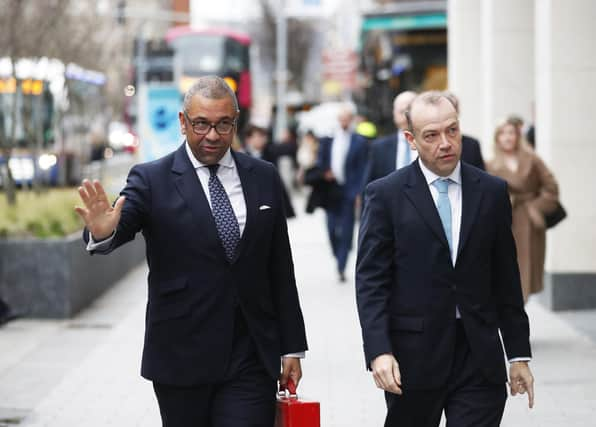Ben Lowry: A UK-EU deal over Northern Ireland might be getting closer but Stormont seems set to stay in stalemate even so


The UK foreign secretary James Cleverly joined the NI Secretary Chris Heaton-Harris in Belfast this week, and the Taoiseach Leo Varadkar and his predecessor Micheal Martin crossed the border.
Any coming deal is, I fear, unlikely to be one with which unionists are happy.
Advertisement
Hide AdAdvertisement
Hide AdThe EU is likely to accept a streamlining of checks on goods moving from Great Britain to NI, but unlikely to concede anything of substance on sovereignty.
The trade border has never been fully implemented (let alone ‘rigorously’ so), and thank goodness not. If it had been, Irish Sea checks would be some of the most onerous of any EU frontier.
Early in 2021, the government was already extending grace periods for agri-food checks. It knew by then that it had struck a bad agreement with the EU over Northern Ireland two years earlier. Following that 2019 deal a triumphant Boris Johnson had met with Brussels bigwigs, and adopted the demeanour of someone who had pulled off some stunning diplomatic triumph, when in fact he had capitulated to EU demands over NI.
By summer 2021, unionists had (belatedly) absorbed the implications of the trade border, and the government then was worried about their reaction to it (which, in fact, has been remarkably muted throughout – because, I believe, much of the border’s implications are hidden). But ministers were, if anything, more worried about the genuine constitutional damage that had been done to the Union by the arrangements to which they had signed up.
Advertisement
Hide AdAdvertisement
Hide AdThis is why they began to highlight the extreme circumstances in which the protocol had been agreed (amid stasis at Westminster that threatened to thwart Brexit entirely).
Government concerns were turned into a ‘command paper’ to overhaul the protocol, but by the end 2021 Mr Johnson’s resolution appeared to be waning.
Then, last year, Downing Street showed renewed zest to minimise the Irish Sea border, with the then prime minister backing the introduction of the Northern Ireland Protocol Bill, championed by his then foreign secretary Liz Truss, which would have allowed ministers to disapply parts of the Irish Sea border.
Many observers think the apparent resolve in London to support NI would always have crumbled once the EU threatened a trade war against a UK that was grappling with the aftermath of Covid. Europe has its own post lockdown challenges, but even so I think there has been a reluctance in some British circles to accept that the EU has greater economic clout than the UK. And even if it didn’t, Rishi Sunak is in a weaker negotiating position than his predecessors, after the Tory party turmoil.
Advertisement
Hide AdAdvertisement
Hide AdThe EU is confident it will be dealing with a less eurosceptic prime minister, Keir Starmer, within two years.
Irish politicians, including leading members of Sinn Fein, were delighted by this week’s announcement that the UK had agreed to share data and to build border posts because it confirmed that there is no prospect of the protocol being torn up. It also showed that rules around NI trade will not return to the UK legal orbit. London would hardly be giving the EU data over real internal trade, such as between Exeter and Edinburgh or Leeds and Lewisham.
It is hard to see Brussels conceding an end to European Court jurisdiction over Northern Ireland trade.
What is the DUP to do? It will lose face if it returns to Stormont after a deal that fails to return NI to unfettered UK trade, unless it concludes that the last few years have proven that most people fail to understand the protocol, and will fall for spin about any deal over it.
Advertisement
Hide AdAdvertisement
Hide AdSome sections of the DUP, perhaps including its influential MPs, might be happier to fight an election in which they oppose a UK-EU deal on the latter’s terms. They know that Jim Allister got 66,000 votes at the May assembly election to the DUP’s 184,000, and would probably have got closer to 100,000 (thus pulling the DUP down to 150,000) if not for unionist concern at a Sinn Fein first minister.
So while a deal seems to be getting closer, an end to the Stormont stalemate does not.
• Ben Lowry (@BenLowry2) is News Letter editor
• Ben Lowry January 7: The UUP has somehow lost a politician who seemed a natural fit for it
• Ben Lowry December 31: Two things to watch out for in 2023, Stormont and strikes
• Ben Lowry December 31: 2022 will always for me be the year when mum and dad died